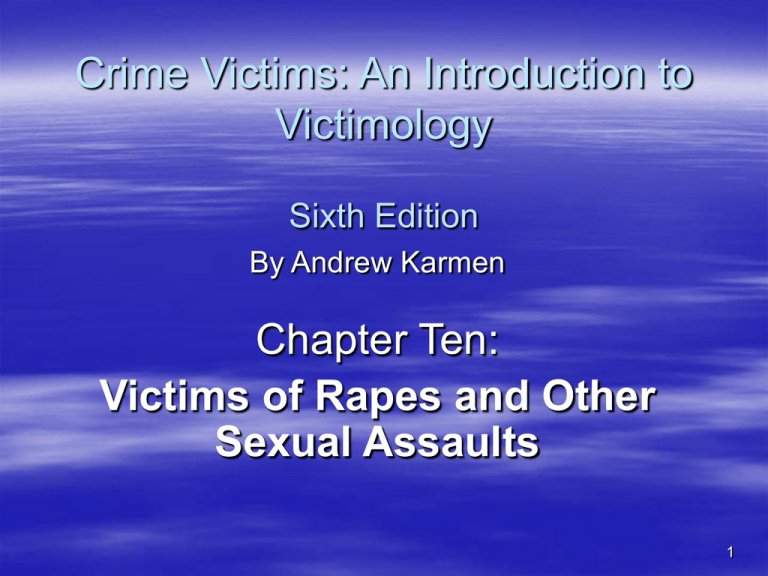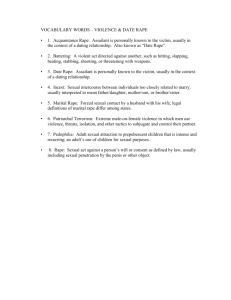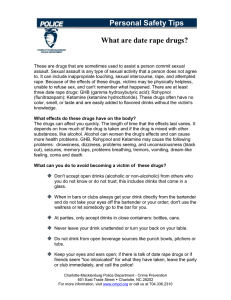
Crime Victims: An Introduction to
Victimology
Sixth Edition
By Andrew Karmen
Chapter Ten:
Victims of Rapes and Other
Sexual Assaults
1
Victims of Sexual Assault
Pro-victim and anti-rape movement of 70s
exposed ongoing injustice, abuse and
systematic neglect
– Women fail to report for many reasons
– CJ system mainly men and more concerned
with relationship prior to the rape than the
violence caused by the rape
– Advocates claim rape is about power and
control—not love or passion
2
Victims of Sexual Assault
RAPE—Latin “rapere” taken by force
Common Law Rape—unlawful carnal
knowledge committed by man against
woman—not his wife
Forcible Rape—Victim fears harm if they do
not comply. Lack of consent is key factor.
Aggravated Rape—More than one assailant
and use of weapon and injuries.
Statutory Rape—Consensual with minor.
3
Victims of Sexual Assault
Real Rapes (Ideal Rapes) vs. Date Rapes
– Real Rapes defined as without question or
doubt. Elements consist of:
Unsuspecting female, complete stranger, victim is a
virgin and virtuous, very young, fights back, struggles
and suffers injuries, involved in wholesome activity
when occurred, when escapes—reports directly to
police.
Forensic evidence found
These cases treated with dignity and with sensitivity by
the CJ system.
4
Victims of Sexual Assault
Doubts arise if any of the above missing
Some argue that if rape preceded by series of
consensual sexual overtones, her “contributory
behavior” makes less serious
Advocates claim that what counts is that she was
stripped of control, denied right to make decision
and compelled to submit to someone else’s sexual
desire
Legal definition hinges on coercion against nonconsenting person
5
Victims of Sexual Assault
Contributory Behavior—forced intercourse
preceded by series of consensual acts—
less serious
Acquaintance Rapes—existence of prior
relationship questions seriousness of act
Victim Precipitation—are some rapes
involving certain circumstances less serious
due to prior conduct of the victim?
6
Victims of Sexual Assault
Victim-Blaming Views
– Victim used alcohol or drugs
– Put herself in temptation opportunity situation
– Suggestive and seductive utterings
– Hitchhiking
– Date rape is “terrible misunderstanding” of what
she said or meant
– Certain lifestyles precipitate rape
7
Victims of Sexual Assault
Two consequences from acceptance of
Victim-blaming
– Male less culpable if female shares
responsibility
– Girls and women must be better educated to
prevent miscommunication of their desires
Misleading seductiveness might be taken as
“implied consent”
8
Victims of Sexual Assault
Victim-Defending Perspective
– Nothing erotic or suggestive could justify such a
hostile act
– Using force should not be confused with making
love or engaging in sex
– Rape is an act of “hate and anger,” not “love or
lust”
– Rape prevention should not just be aimed at
females
9
Victims of Sexual Assault
Consequences of Sexual Assault
– Rape Crisis Syndrome
– Post Traumatic Stress Disorder
– 2/3 of rapes not completed but still leave
psychological scars—may commit suicide
10
Incident Prevalence
UCR vs. NCVS—See Figure 10.1, page 252
NCVS—In 2004, 36% reported their rape to the
authorities—64% not reported
Rape trends decreasing since 90s
Portrait of victims
– Female late teens-early twenties
– Unmarried, low income
– Black, unemployed, resides in large city
– 55% acquaintances, 44% strangers
11
Victims of Sexual Assault
How the Criminal Justice System Handles
Rape Victims
– The Crime
– Charges Are Pressed Against Defendant
– The Trial
– The Sentence
12
Controversy Over Unfounded
Accusations
Rape is unique crime—credibility of victim
– Safeguards must prevent honest mistakes and
perjury/fraudulent allegations
Must have corroborative evidence—rape kits, DNA,
lie detector, hospital tests
1982: President’s Task Force ruled all tests for
victim credibility in rape cases must stop
13
Accuser vs. Accused
6th Amendment rights to wage a vigorous defense
New Rape Victim Rights Legislation
Several Defense Strategies
– Eyewitness error
– Deny it ever happened—attack victim credibility
– It happened but consensual—she changed her mind
after the event
14
Accuser vs. Accused
Rape Shield Laws
Force and Resistance
– Reasonableness standard—degree of
resistance that expresses non-consent can
depend on circumstances
Best Prevention Strategy—dual response
defense
– Calling out for help while simultaneously
pleading with or threatening the attacker
15
Accuser vs. Accused
Corroboration—not required unless:
– Victim is a minor
– Previously intimate with offender
– Did not promptly report crime
– Provides a version of events that is inherently
improbable and self-contradictory
16
Arrest, Prosecution and Adjudication
50% not reported
Reported if weapon used or injuries
35% of those charged will have charges
dropped
3% will be acquitted
61% convicted—35%-prison, 10%-jail
Negotiated plea often justified as it spares
accuser having to recount the crime
17
Rape Crisis Centers
24-hour hotline
Put victim in touch with advocates
Accompany to hospital/police/prosecutor
Arrange for counseling
Trains CJ members
Public education efforts
Offers self-defense strategies
18
Rediscovery of More Rape Victims
Wives raped by husbands
– Wife has a right to say “no”
– Forcible rape of a spouse—1st law passed in
South Dakota, 1975
– 1990: every state provided no immunity if
husband filed for divorced or separated
– Occurrences not known—lack of reporting
19
Rediscovery of More Rape Victims
Sexually Assaulted Males
NCVS reported 125,000 male rape victims
in 1973-1982
2-3% of reported rapes—male on male
Prison Rape Reduction Act of 2003
– 13% of inmates raped by males
– Institutions put on notice they must detect,
prevent and punish rape behind bars
20
Reducing the Threat of Rape:
Three Approaches
1. Blame the victim (popular strategy of
past—not today): Encourage females to
not precipitate the crime through careless,
reckless or provocative behavior
2. Blame the Offender: predators are source
of problem—remove them from society
21
Reducing the Threat of Rape:
Three Approaches
3. Sociological approach
Rape outgrowth of social conditions, cultural themes
about women as sex objects for sexual gratification
– Real problem is patriarchal society
– Deterrence through incarceration teaches men a
lesson
– Long term strategy is to deal with movies, music,
magazines encouraging sexual behavior and must
change attitudes about women
22
Key Terms
Carnal Knowledge
Statutory Rape
Heiress stealing
Ideal types
Implied consent
Rape crisis syndrome
Post traumatic stress
disorder (PTSD)
Dual verbal defense
Series victimizations
23



